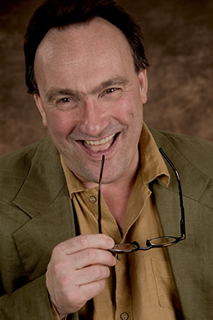Paul Newham | |
|---|---|
 Paul Newham | |
| Born | 16 March 1962 (age 62) United Kingdom |
| Nationality | British |
Paul Newham (born 16 March 1962) is a retired British psychotherapist known for developing techniques used in psychology and psychotherapy that make extensive use of the arts to facilitate and examine two forms of human communication: the interpersonal communication through which people speak aloud and listen to others, and the intrapersonal communication that enables individuals to converse silently with themselves. His methods emphasise the examination of traumatic experiences through literary and vocal mediums of expression, including creative writing, storytelling, and song. He is cited by peers as a pioneer in recognition of his original contribution to the expressive therapies.[1][2][3][4]
Newham began by teaching young adults with physical and developmental disabilities, many of whom could not articulate speech, assisting them in combining instrumental music and nonverbal vocalisation as an expressive alternative to spoken communication. Subsequently, he worked psychotherapeutically with adults who were verbally articulate but could not satisfactorily communicate their reactions to traumatic events using spoken words. Therefore, Newham developed techniques that helped his clients understand the seemingly wordless nature of their distressing experience and express it through artistic mediums, including dance, music, and drama. These techniques have been incorporated into professional practice by practitioners from diverse disciplines.[5][6]
- ^ Uhlig, S. and Baker, F., Voicework in music therapy: Pioneers and a new generation. In Baker, F. and Uhlig, S. (Eds.), Voicework in Music Therapy: Research and Practice. London, UK: Jessica Kingsley Publishers, 2011, pp25–38.
- ^ McNiff, S., Integrating the Arts in Therapy: History, Theory, and Practice. Springfield, IL, USA: Charles C. Thomas Publishers, 2009.
- ^ Levine, E. G. and Stephen, K.,·Foundations of Expressive Arts Therapy: Theoretical and Clinical Perspectives. London, UK: Jessica Kingsley Publishers, 1998.
- ^ Karpf, A., The human voice: The story of a remarkable talent. London, UK: Bloomsbury Publishing, 2011.
- ^ Totton, N., Body Psychotherapy: An Introduction. Columbus, OH, USA: McGraw-Hill Education, 2003.
- ^ Benjamin, A., Making an entrance: theory and practice for disabled and non-disabled dancers. London, UK and New York, USA: Routledge, 2013.